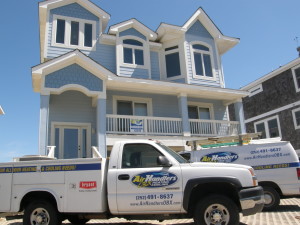September 14, 1999. Do you remember where you were?
Fifteen years have passed since Hurricane Floyd made landfall in eastern North Carolina. In a region already soaked by Dennis’ arrival a few weeks before, Floyd proved to be a storm no North Carolinian will soon forget. Hurricane Floyd was the third major storm of its type during the 1999 Atlantic hurricane season, and forced 2.6 million coastal residents to flee their homes. Torrential rainfall, heavy winds, and widespread flooding resulted in 57 fatalities, and $4.5 billion in damage.
Eventually, the floodwaters receded, and residents made their way back to their homes — some salvageable, some not — to begin picking up the pieces.
Let’s all knock on wood (*knock knock*) that the remainder of the 2014 season proves docile, but the truth is, we just never know when the next major storm might strike. Be prepared when it does. There are steps you, as a homeowner, can take to protect your HVAC unit before, during, and after a hurricane.
Before a Storm
Secure the outdoor condensing unit. It is recommended to place a metal cage around the unit, or to fix it in place with straps, providing protection from hurricane-force winds and flying debris. It is not recommended to use a tarp, as this might cause the compressor to overheat and malfunction.
Clear the nearby areas of loose objects. Patio furniture, potted plants, and bicycles might get picked up and tossed around during a strong storm. Move these and other such items indoors when possible to avoid causing impact damage to your HVAC unit.
During a Storm
Turn your unit off. When the threat of a storm is imminent, cool your house as much as possible, and then turn the air conditioner to OFF, at the thermostat and the breaker box. Power surges and outages are not uncommon during a hurricane, and doing so will minimize the risk of internal damage to your unit.
Stay inside, and stay safe.
After a Storm
Visually inspect the unit before turning it back on.Wait until it is safe to do so, and then perform a visual inspection of your outdoor condensing unit. Look for obvious dents, dings, or other such circumstances — like contact with saltwater — that might make it hazardous to restart the air conditioner. If you’re unsure, contact the certified air conditioner repair technicians at Air Handlers OBX to inspect the unit for you.
Turn the outdoor condensing unit back on, slowly. Wait at least 20 minutes after power has been restored to restart the unit. This will ensure the connection is stable, and that it’s safe to resume normal activity.
It is our hope (and surely yours) that we never again see a storm like Floyd, but in the event of any hurricane, large or small, Air Handlers OBX is standing by to handle all of your pre- and post-hurricane inspection needs.



